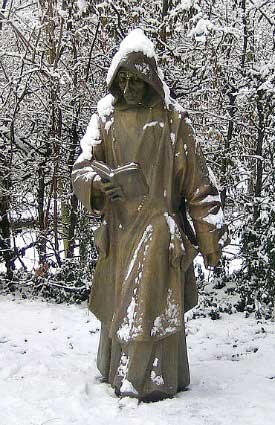
In the late 600s, there lived a man named Drithelm, whose home was in Cunninghame, Northumbria. Today, that would be quite near the border of Scotland and England, not to far from the North Sea. Drithelm was a wealthy man, married, with a devout Catholic family.
In 693-696, there was a severe plague going around. Drithelm was sickened and quickly died. The next morning, his family and mourners were gathered around his bier. As they prayed, the corpse sat up and began to speak. Obviously, he was not ill, nor did he look ill any longer. Almost everyone ran away due to fear, except his wife.
To her, he explained, “Be not afraid, for now I am truly risen from death and allowed again to live among men…But, hereafter, I am not to live as I have been wont, but rather, in a very different manner.” Then he climbed out of his bier and went to church, where he stayed all night, praying. The next day, he came home and proceeded to divide up his possessions, giving them to his wife, his children and the poor.
He left his home, traveling to visit King Aldfrith of Northumbria and Aethelwood, the bishop of Linidsfarne. To them, and to an Irish monk, named Haemgisl, he gave the same story. On his death, someone, perhaps his guardian angel, took him on a road. There they saw several distinct places. One was a place that straddled the road. On one side was fire consuming all, on the other snow and hail. He saw people blown from one side to the other. In another place were pits of fire that had a terrible stench. In a third place was a meadow with sweet-smelling flowers. The first place was the spot in Purgatory where people who converted on their deathbed go. They have much to answer for and much to improve. The second place was Hell. The third place was the spot, in Purgatory, where people who have done little wrong go, awaiting their turn to enter the light which was Heaven. He was told that Masses and prayers helped the dead in Purgatory reach their goal of Heaven sooner.
After seeing all that, and understanding what it was, Drithelm wished to dedicate his remaining years to God. With the king’s help, he was admitted to an abbey over the border into Scotland, on the banks of the river Tweed. His years there were spent in penance, simplicity and prayer. One instance shows his commitment to penance: He would say the Psalms, standing in icy waters. When such a feat was pointed out to him as astonishing, Drithelm said he had seen colder, and continued on. He gave such good example and good advice that many were converted.
The monk, Haemgisl, told the story to the venerable writer, Bede. The historian recorded it in his book, Ecclesiastical History of the English People.

Recent Comments